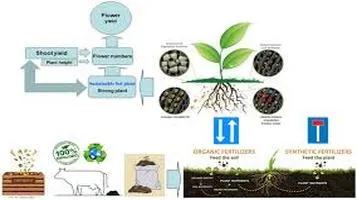The Efficacy and Benefits of Organic Fertilizers
Organic fertilizers are naturally derived substances used to enrich soil and promote plant growth. Unlike synthetic fertilizers, they are made from organic materials such as compost, animal manure, bone meal, fish emulsion, and green manure. These fertilizers release nutrients slowly, improving soil structure, enhancing its ability to retain water and nutrients, and fostering beneficial microbial activity. Organic fertilizers contribute to sustainable farming practices by reducing chemical runoff and promoting biodiversity. They are also safer for the environment and human health, minimizing the risk of soil and water contamination. While they may act more slowly than synthetic options, the long-term benefits include enhanced soil fertility and a healthier ecosystem, making them an excellent choice for environmentally-conscious gardeners and farmers.

In recent years, the agricultural sector has witnessed a paradigm shift towards more sustainable and environmentally friendly practices. Organic fertilizers have emerged as a cornerstone of this movement, touted for their numerous benefits to both the soil and overall ecosystem. This review delves into the efficacy, advantages, and potential drawbacks of organic fertilizers, aiming to provide a comprehensive understanding of their role in modern agriculture.
What Are Organic Fertilizers?
Organic fertilizers are derived from natural sources such as plant residues, animal manure, compost, and other organic matter. Unlike synthetic fertilizers, which are chemically processed, organic fertilizers undergo minimal processing, thereby retaining the natural nutrients and beneficial microorganisms found in the raw materials. Common types include compost, green manure, bone meal, blood meal, and fish emulsion.
Efficacy of Organic Fertilizers
One of the primary advantages of organic fertilizers is their ability to improve soil health over time. Soil health is a critical component of sustainable agriculture, influencing crop yield, water retention, and resistance to pests and diseases. Organic fertilizers enhance soil structure by increasing its organic matter content, which in turn improves aeration, water infiltration, and root penetration.
Additionally, organic fertilizers release nutrients slowly and consistently, providing a steady supply of essential nutrients to plants. This slow-release mechanism reduces the risk of nutrient leaching, a common problem associated with synthetic fertilizers, which can lead to groundwater contamination.
Studies have shown that organic fertilizers can be equally, if not more, effective than synthetic fertilizers in promoting plant growth and yield. For instance, a study published in the "Journal of Plant Nutrition and Soil Science" found that crops treated with compost and manure exhibited comparable yields to those treated with synthetic fertilizers, with the added benefit of improved soil health over the long term.
Environmental Benefits
The environmental benefits of organic fertilizers are manifold. Firstly, they help reduce the dependency on chemical inputs, thereby lowering the risk of soil and water pollution. Synthetic fertilizers often contain high levels of nitrogen and phosphorus, which can leach into water bodies and cause eutrophication—a process that depletes oxygen in water and harms aquatic life. Organic fertilizers, on the other hand, release nutrients at a rate that plants can absorb, minimizing the risk of runoff and leaching.
Furthermore, organic fertilizers contribute to carbon sequestration. By increasing the organic matter content in soil, they enhance the soil's ability to capture and store carbon dioxide from the atmosphere. This process not only helps mitigate climate change but also improves soil fertility and structure.
Organic fertilizers also promote biodiversity. The application of organic matter encourages the proliferation of beneficial soil microorganisms, earthworms, and insects, which play a crucial role in nutrient cycling and soil health. This biodiversity is often diminished in soils treated with synthetic fertilizers and pesticides.
Economic Considerations
From an economic perspective, organic fertilizers can be both cost-effective and financially rewarding in the long run. While the initial cost of organic fertilizers may be higher than that of synthetic alternatives, the long-term benefits—such as improved soil health, reduced need for chemical inputs, and enhanced crop resilience—can lead to significant savings. Moreover, the growing consumer demand for organic produce can provide farmers with a premium price for their products, offsetting the initial investment in organic fertilizers.
Potential Drawbacks
Despite their numerous advantages, organic fertilizers are not without their limitations. One of the primary concerns is nutrient variability. Unlike synthetic fertilizers, which provide a precise nutrient composition, the nutrient content in organic fertilizers can vary widely depending on the source material and processing methods. This variability can make it challenging for farmers to meet the specific nutrient requirements of their crops.
Another drawback is the slower nutrient release rate. While this can be beneficial for reducing nutrient leaching and providing a steady nutrient supply, it may not meet the immediate nutrient needs of fast-growing crops. In such cases, a combination of organic and synthetic fertilizers, known as integrated nutrient management, may be necessary to achieve optimal results.
Moreover, the bulkiness of organic fertilizers can pose logistical challenges. Large quantities are often required to supply sufficient nutrients, which can increase transportation and application costs. Additionally, improper handling and storage of organic fertilizers, especially animal manure, can lead to odor issues and the potential spread of pathogens.
Conclusion
In conclusion, organic fertilizers offer a sustainable and environmentally friendly alternative to synthetic fertilizers, with numerous benefits for soil health, biodiversity, and crop yield. While there are challenges associated with their use, such as nutrient variability and logistical considerations, the long-term advantages often outweigh these drawbacks. As the agricultural sector continues to move towards more sustainable practices, organic fertilizers are likely to play an increasingly important role in promoting soil health, environmental sustainability, and economic viability. Whether you are a large-scale farmer or a home gardener, incorporating organic fertilizers into your nutrient management plan can yield substantial benefits for both your plants and the planet.






